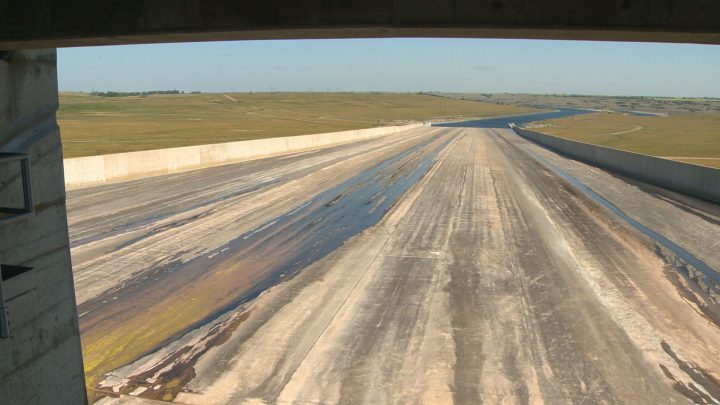It’s a massive project that was built 50 years ago and has been critical in Saskatchewan for fresh drinking water, flood mitigation and power.

In 1967, Gardiner Dam was officially opened after the idea was spawned in the Dirty ’30s. It would take another 25 to nurture the vision and then 10 more years to build.
READ MORE: Balgonie, Sask. receives funding for $6.4 million wastewater system expansion
It’s was a historic piece of infrastructure back then, today and into tomorrow as the province’s population grows.
There is also no doubt standing on the spillway or watching as a gate is opened for water to flow, half a century later Gardiner Dam is still impressive.
“That’s a great occasion for Saskatchewan and Canada to see what this kind of vision and infrastructure development can actually mean for the well-being of the Prairie basin,” Ralph Goodale, Canada’s minister of public safety, said.
It took nine years to build and it’s width at the base is 1.6 kilometres long. Gardiner Dam is also five kilometres in length and at the time cost $120 million to build.

Get daily National news
“In modern day terms the construction value would be over a billion dollars.”
It’s one of the largest earth-filled dams in the world by embankment volume. Along the spillway the drop down on the dam side is a 44 feet and 24 feet down on the Lake Diefenbaker side.
“I think from a flood mitigation perspective it’s just a great piece of infrastructure in the province, and from a clean energy source a tremendous piece of infrastructure here in Saskatchewan,” Scott Moe, the minister responsible for Saskatchewan’s Water Security Agency, said.
READ MORE: A look inside Coteau Creek Hydroelectric Station
The hydroelectric station located one kilometre downstream can power as many as 100,000 homes.
“You’d be able to power 18,600,000 – 100 watt light bulbs,” Robert Hefner, a dual-trained hydrostation operator for SaskPower, said.
“When they’re putting out that much power – the water that needs to come through the generators to get that much power is enough to fill an Olympic swimming pool in about eight seconds.”
It is also one of only three sites that could trigger power restoration in the event of a province-wide blackout if outside power from other provinces wasn’t an option.
- Tumbler Ridge B.C. mass shooting: What we know about the victims
- ‘We now have to figure out how to live life without her’: Mother of Tumbler Ridge shooting victim speaks
- Trump slams Canada as U.S. House passes symbolic vote to end tariffs
- Oysters from Stellar Bay Shellfish brand recalled for norovirus risk
The force of the flowing water from Lake Diefenbaker rotates three-84,000 horsepower turbines which drive generators to produce electricity.
Lake Diefenbaker, when full, holds 9.4 billion cubic meters of water and officials said it is a safe water supply to over 60 per cent of municipalities in the province.
“Communities such as Saskatoon, Moose Jaw and Regina – you know all directly or indirectly receive their clean, safe drinking water from this stable water supply so what a great day for the province of Saskatchewan and for Canada.”
An amazing achievement that was marked on Friday by hundreds with a dam good celebration nearby.





























Comments
Want to discuss? Please read our Commenting Policy first.